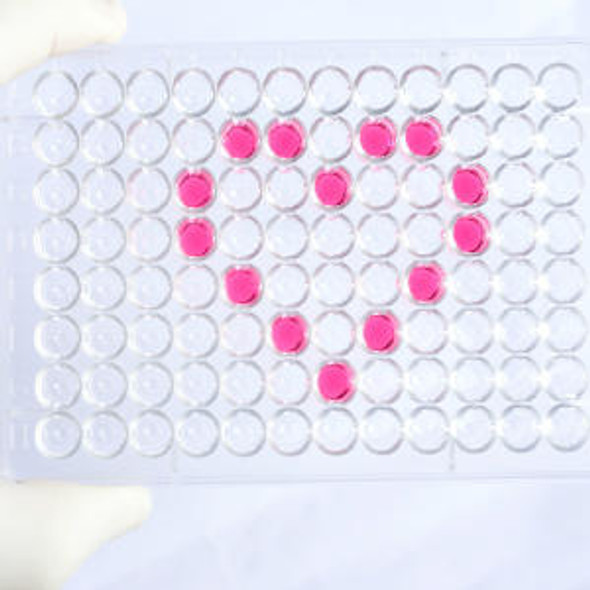Description
| Product Name: | MUC4 Rabbit mAb |
| Product Code: | CAB3438 |
| Size: | 20uL, 50uL, 100uL |
| Synonyms: | ASGP, HSA276359, MUC-4 |
| Applications: | WB, IHC |
| Reactivity: | Human, Rat |
| Host Species: | Rabbit |
| Immunogen: | A synthesized peptide derived from human MUC4 |
| Applications: | WB, IHC |
| Recommended Dilutions: | WB 1:500 - 1:2000 IHC 1:50 - 1:200 |
| Reactivity: | Human, Rat |
| Positive Samples: | HeLa |
| Immunogen: | A synthesized peptide derived from human MUC4 |
| Purification Method: | Affinity purification |
| Storage: | Store at -20°C. Avoid freeze / thaw cycles. Buffer: PBS with 0.02% sodium azide, 0.05% BSA, 50% glycerol, pH7.3. |
| Isotype: | IgG |
| Sequence: | Email for sequence |
| Gene ID: | 4585 |
| Uniprot: | Q99102 |
| Calculated MW: | 120kDa |
| Observed MW: | 120KDa |
| UniProt Protein Function: | MUC4: May play a role in tumor progression. Ability to promote tumor growth may be mainly due to repression of apoptosis as opposed to proliferation. Has anti-adhesive properties. Seems to alter cellular behavior through both anti-adhesive effects on cell-cell and cell-extracellular matrix interactions and in its ability to act as an intramembrane ligand for ERBB2. Plays an important role in cell proliferation and differentiation of epithelial cells by inducing specific phosphorylation of ERBB2. The MUC4-ERBB2 complex causes site-specific phosphorylation of the ERBB2 'Tyr-1248'. In polarized epithelilal cells segragates ERBB2 and other ERBB receptors and prevents ERBB2 from acting as a coreceptor. The interaction with ERBB2 leads to enhanced expression of CDKN1B. The formation of a MUC4-ERBB2-ERBB3-NRG1 complex leads to down-regulation of CDKN1B, resulting in repression of apoptosis and stimulation of proliferation. 14 isoforms of the human protein are produced by alternative splicing. |
| UniProt Protein Details: | Protein type:Membrane protein, integral Chromosomal Location of Human Ortholog: 3q29 Cellular Component: extracellular space; Golgi lumen; integral to plasma membrane; vesicle Molecular Function:ErbB-2 class receptor binding Biological Process: maintenance of gastrointestinal epithelium; O-glycan processing |
| NCBI Summary: | The major constituents of mucus, the viscous secretion that covers epithelial surfaces such as those in the trachea, colon, and cervix, are highly glycosylated proteins called mucins. These glycoproteins play important roles in the protection of the epithelial cells and have been implicated in epithelial renewal and differentiation. This gene encodes an integral membrane glycoprotein found on the cell surface, although secreted isoforms may exist. At least two dozen transcript variants of this gene have been found, although for many of them the full-length transcript has not been determined or they are found only in tumor tissues. This gene contains a region in the coding sequence which has a variable number (>100) of 48 nt tandem repeats. [provided by RefSeq, Jul 2008] |
| UniProt Code: | Q99102 |
| NCBI GenInfo Identifier: | 338817990 |
| NCBI Gene ID: | 4585 |
| NCBI Accession: | Q99102.4 |
| UniProt Secondary Accession: | Q99102,O95938, Q9GZM2, Q9GZV6, Q9H481, Q9H482, Q9H483 Q9H484, Q9H485, Q9H486, Q9H487, Q9H4D6, |
| UniProt Related Accession: | Q99102 |
| Molecular Weight: | 206,605 Da |
| NCBI Full Name: | Mucin-4 |
| NCBI Synonym Full Names: | mucin 4, cell surface associated |
| NCBI Official Symbol: | MUC4 |
| NCBI Official Synonym Symbols: | ASGP; MUC-4; HSA276359 |
| NCBI Protein Information: | mucin-4 |
| UniProt Protein Name: | Mucin-4 |
| UniProt Synonym Protein Names: | Ascites sialoglycoprotein; ASGP |
| Protein Family: | Mucin |
| UniProt Gene Name: | MUC4 |






